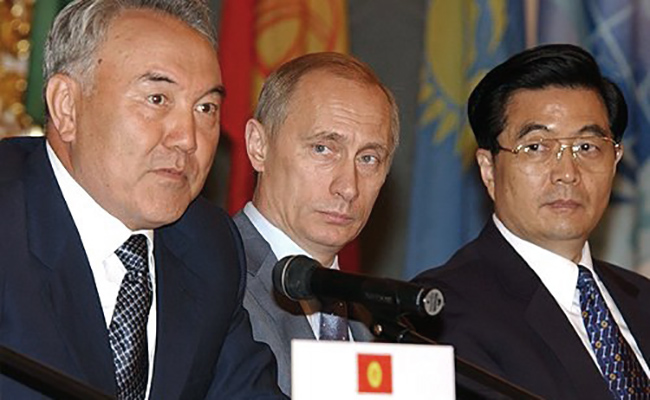As part of the discussion on the nearest future of Kazakhstan, in this article, we are going to analyze a plan to shift the supreme power after President Nazarbayev passes away. Let us see how feasible this plan is.
The essence of this plan is that Nursultan Nazarbayev has chosen his nephew Samat Abish as his successor and the next president of Kazakhstan. Samat Abish currently holds the position of the first deputy chair of the Kazakhstan National Security Agency (NSA).
Based on an insider information, four persons guarantee this plan’s execution – the head of the Kazakhstan NSA Karim Masimov, a Vice-Prime-Minister of Kazakhstan Imangali Tasmagambetov, the presidential chief of staff Adilbek Dzhaksybekov. The fourth guarantor is President Nazarbayev’s eldest daughter Dariga who, as soon as the time comes, will take on the leadership of the Senate in the Kazakhstan Parliament.
We will start analyzing this plan with reviewing Samat Abish’s persona.

Samat Abish was born in 1978. It means that, already in 2018, he will fulfill the Constitutional requirement on the minimal age for the head of the state (must be no younger than 40 years old). What is more, Samat Abish is the representative of the next generation of the Nazarbayev family who has been least exposed by the media. Unlike his cousin-sisters’ and his brother Kayrat Satybalda’ reputation, Abish’s name has never been compromised. And that is one of his greatest advantages.
It is easy to see that Samat Alish may de-facto repeat Vladimir Putin’s career rise. Both are secret service sworn officers. To succeed, Abish needs to become the head of the NSA at the right time. Then, he can easily take the position of the Prime-Minister and, after Nazarbayev’s passing, become the state leader in accordance with the Constitutional law. If, at that time, Dariga Nazarbayeva will serve as the head of the Senate and Nurlan Nigmatullin remains the leader of the Parliament, they will not raise any difficulties especially considering that both are representatives of the Karaganda clan.
So why did Nazarbayev choose these four as the Abish’s plan guarantors?
One may assume that the “leader of the nation” is trying to build some stable structure that will be balanceable from the above as well as from the below. This structure must be able to sustain such harsh a blow as the disappearance of the established center of supreme power. Obviously, while choosing the guarantors, Nazarbayev took into consideration the level of his personal trust to these people as well as the relationships among the four, their political and business interests and, of course, their downfalls.
In this structure, Dariga Nazarbayeva serves as the representative of the presidential Family.

There is no doubt that Nazarbayev’s eldest daughter is a super-ambitious person. However, she is a poor organizer and an unqualified manager. Thus, her time as a Vice-Prime-Minister was so short. Still, Dariga has a great deal of influence over her sisters with whom she shares a multi-billion-dollar fortune. She is also quite influential in the Kazakhstan media market. The most important thing, however, is the fact that, after Nursultan Nazarbayev’s death, she will become the head of the Family. It is essential considering that some of this family members’ suitability is quite questionable.
Karim Masimov has been and still is one of Nazarbayev’s most trusted allies.

Based on an unofficial data, Masimov controls a big part of the Nazarbayev family’s multi-billion assets that, after Kazakhgate, have been moved out to Hong Kong, Malaysia, and the East. He also serves as a negotiator with the leaders of the Kazakhstan’s two key partners, Russia and China, on a regular basis. Notice also that he is vulnerable politically. There exists enough compromising material to destroy not just his state career but his very life.
Imangali Tasmagambetov is also one of the most influential figures in Nursultan Nazarbayevs’ circle. Not only does he carry weight among the Kazakhstan intelligentsia but also, he is quite capable as a state manager.

Through his son-in-law Kenes Rakishev, Imangali Tasmagambetov controls the biggest and the most problem-plagued bank in Kazakhstan. He also has a direct influence on the just as problem-plagued local elites in the Western area of the country. Choosing Tasmagambetov as one of the guarantors is an insightful act on the part of the President. If Tasmagambetov violates his faith, he becomes psychologically vulnerable if there is to be a conflict.
Adilbek Dzhaksybekov was chosen as the presidential chief of staff.

He controls the state machine which means he will be the one responsible for ensuring the stability of the presidential hierarchy during the post-Nazarbayev period. Therefore, it was inevitable that he was chosen as one of the four.
Note that the personal relationships among the persons named above are far from ideal. However, we are not going to dwell on this subject here. Their personal biases do not matter in this case. The decisions made are rational and the alliances formed are strictly of a political, utilitarian nature.
There is still a question why Nursultan Nazarbayev restricted the number of the guarantors to just four. We might assume that two would be too few. They could change the deal and act differently than they had promised. In choosing three, there is a risk the two may form an alliance and eliminate the third person. Considering the history of the USSR, there is logic in Nursultan Nazarbayev’s decision. In the instances when polyarchy was formed in the state leadership, it was always a troika. Consequently, two of this three would form an alliance and destroy the third.
Why Nazarbayev did not choose more than four guarantors is understandable, too. The more the people, the greater the risk of infighting. Besides, the number of those who hold a high position in the state machine and, at the same time, have a real influence on things is dismal in Kazakhstan. That same Speaker of the Senate Kasym-Zhomart Tokayev is nothing but a cero absoluto, from that perspective.
So, given the circumstances, the four guarantors look like an optimal solution.
Thus, our analysis confirms that if the plan to shift the power to Samat Abish exists (after his uncle’s death, of course), it is quite rational, justified and executable. Moreover, there is talk in Akorda that this plan has already been discussed with the leaders of Russia and China. Both leaderships approved the plan.

Of course, whether Abish will be able to become not just the second president of Kazakhstan but the second leader of the nation is another matter.




